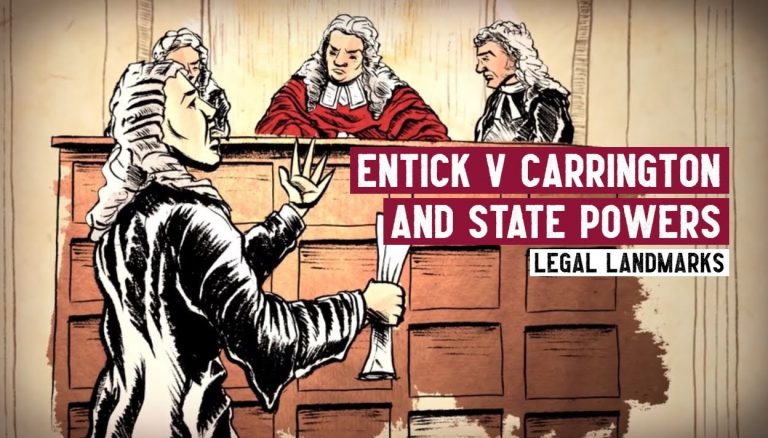
On 11 November 1762, the King’s messengers; James Watson, Thomas Ardran, and Robert Blackmore led by Nathan Carrington, while acting on the instructions and orders of Lord Halifax, the secretary of state to the king broke into the home of Sir John Entick, a famous writer, who constantly write and publish seditious and defamatory things about the government.
The messengers broke into his home with “force and arms” and spent over four hours ransacking through his properties and searched all the rooms and destroyed some of his personal belongings in the process and then took away 100 charts and 100 pamphlets.
John Entickson sued the king’s messenger for trespass claiming £2000 in damages. In the king’s messengers’ defence, they claimed that they were duly sent by the government through the written warrant issued to them by the secretary of state to go and conduct a search in the plaintiff’s house, hence why they cannot be held liable for trespass.
Register for Tekedia Mini-MBA edition 18 (Sep 15 – Dec 6, 2025) today for early bird discounts. Do annual for access to Blucera.com.
Tekedia AI in Business Masterclass opens registrations.
Join Tekedia Capital Syndicate and co-invest in great global startups.
Register for Tekedia AI Lab: From Technical Design to Deployment.
The court held in the favour of the claimant holding that the secretary of state, Lord Halifax had no statutory rights to issue warrants of search, therefore, the warrant purportedly issued to the defendants was invalid and their action of breaking into the claimant’s house amounted to trespass.
The matter was presided over by Lord Camden, the Chief Justice of the common plea, while in his obiter the Lord justice made the famous pronouncement which has come to found the grounds and the rule of law as relating to trespass in the English common law, he stated inter alia, thus;
“The great end, for which men entered into society, was to secure their property. That right is preserved, sacred and incommunicable in all instances, where it has not been taken away or abridged by some public law for the good of the whole. The cases where this right of property is set aside by private law, are various. Distresses, executions, forfeitures, taxes etc are all of this description; wherein every man by common consent gives up that right, for the sake of justice and the general good. By the laws of England, every invasion of private property, be it ever so minute, is a trespass. No man can set his foot upon my ground without my licence, but he is liable to an action, though the damage be nothing; which is proved by every declaration in trespass, where the defendant is called upon to answer for bruising the grass and even treading upon the soil. If he admits the fact, he is bound to show by way of justification that some positive law has empowered or excused him. The justification is submitted by the judges, who are to look into the books; and if such a justification can be maintained by the text of the statute law, or by the principles of common law. If no excuse can be found or produced, the silence of the books is an authority against the defendant, and the plaintiff must have judgment”
The above obiter by Lord Camden also later became viewed as a general principle of restrictions of the powers of the government, hence; “the state may do nothing but that which is expressly authorised by law” this implies that the government must have the legal authority to interfere with the rights of an individual and cannot simply assert state necessity as a justification.
As a rule, established by the above case, if a defendant enters a claimant’s property without being invited by the owner of the property or lawful excuse or legal warrant, that defendant has committed a trespass against the claimant which is actionable in tort; it does not matter if the defendant is a law enforcement agent acting in the authority of the government, once it is established that the person in question has entered a property without a lawful excuse or a legal warrant, trespass has taken place.


